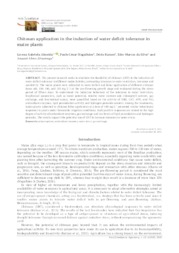Chitosan application in the induction of water deficit tolerance in maize plants.
Chitosan application in the induction of water deficit tolerance in maize plants.
Author(s): ALMEIDA, L. G.; MAGALHAES, P. C.; KARAM, D.; SILVA, E. M. da; ALVARENGA, A. A.
Summary: The present research seeks to elucidate the feasibility of chitosan (CHT) in the induction of water deficit tolerance in different maize hybrids, contrasting tolerance to water restriction, tolerance and sensitivity. The maize plants were subjected to water deficit and foliar application of different chitosan doses (60, 100, 140, and 180 mg L-1) at the pre-flowering growth stage and evaluated during the stress period of fifteen days. To understand the induction behaviour of the tolerance to water restriction, biophysical parameters, such as water potential, relative water content and chlorophyll content, gas exchange, and biochemical assays, were quantified based on the activity of SOD, CAT, APX, and PAL antioxidant enzymes, lipid peroxidation activity and hydrogen peroxide content. Among the treatments, maize plants subjected to chitosan foliar application at a dose of 140 mg L-1 presented similar behavioural responses to plants under favourable irrigation conditions. Such positive responses are related to the high degree of activity of antioxidant enzymes, gas exchange and low levels of lipid peroxidation and hydrogen peroxide. The results support the potential use of CHT to increase tolerance to water stress.
Publication year: 2020
Types of publication: Journal article
Unit: Embrapa Maize & Sorghum
Keywords: Antioxidante, Antiperspirante, Enzima, Estresse hídrico, Milho, Troca de gás
Observation
Some of Embrapa's publications are published as ePub files. To read them, use or download one of the following free software options to your computer or mobile device. Android: Google Play Books; IOS: iBooks; Windows and Linux: Calibre.
Access other publications
Access the Agricultural Research Database (BDPA) to consult Embrapa's full library collection and records.
Visit Embrapa Bookstore to purchase books and other publications sold by Embrapa.

